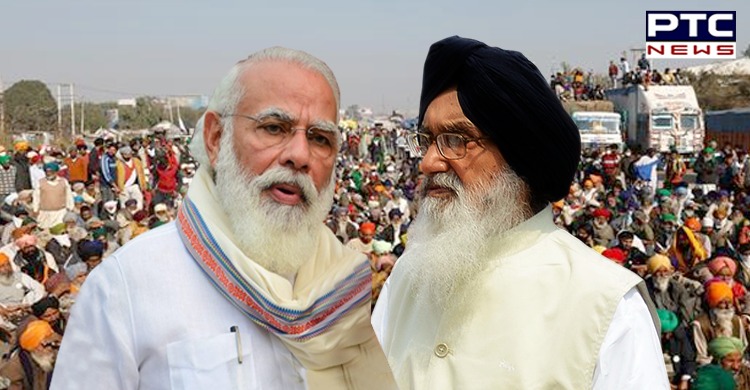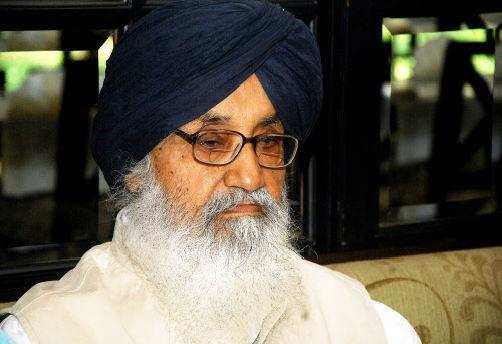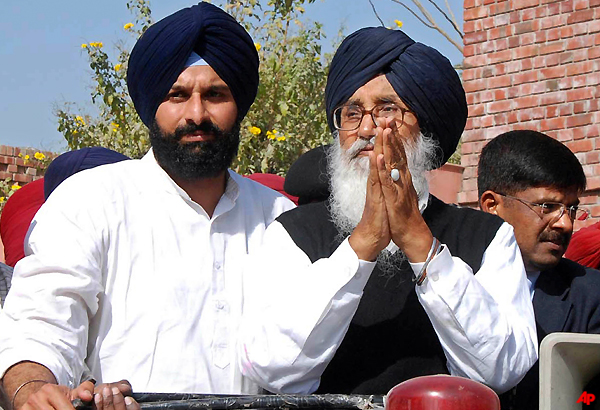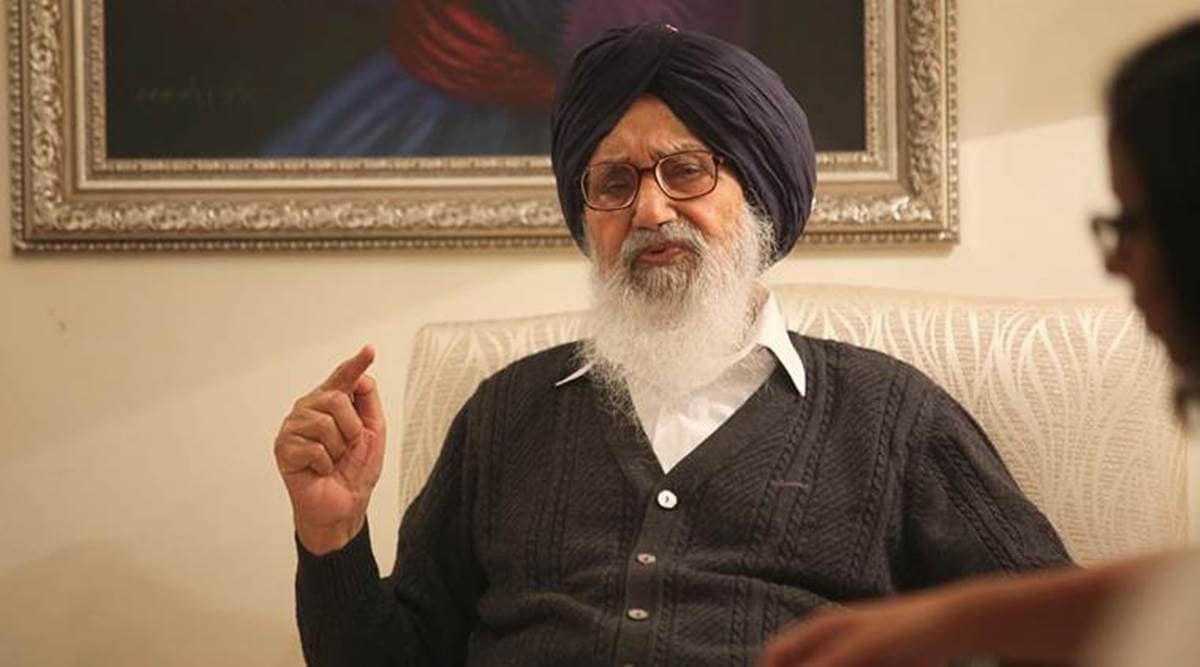

Parkash Singh Badal to Modi: Immediately scrap three farm acts
Five times Punjab Chief Minister Sardar Parkash Singh Badal called upon the Prime Minister Narendra Modi to ‘show magnanimity’ and immediately scrap the three controversial farmers Acts “as a first step” towards the resolution of the serious crisis confronting the country today. “The scars of wounds already inflicted will take a long time to heal”, he said.
 Also Read | SAD to hold Akhand Path at Sri Akal Takht on Dec 12 to kick start 100 year celebrations of the party
The former Chief Minister also demanded that “100% procurement of farmers’ produce be purchased at Minimum Support Price (fixed as per Swaminathan Formula, C2 50) and that this be made a statutory legal right of the farmer.”
Mr. Badal also emphasized the "the need for a liberal, secular democratic approach to solve all the problems facing the country.”
Also Read | SAD to hold Akhand Path at Sri Akal Takht on Dec 12 to kick start 100 year celebrations of the party
The former Chief Minister also demanded that “100% procurement of farmers’ produce be purchased at Minimum Support Price (fixed as per Swaminathan Formula, C2 50) and that this be made a statutory legal right of the farmer.”
Mr. Badal also emphasized the "the need for a liberal, secular democratic approach to solve all the problems facing the country.”

 Mr. Badal also drew the Prime Minister’s attention to “how politics of confrontation has fractured our social fabric. Consultation, conciliation and consensus are the foundation of any democracy. Consultative processes alone lead to consensus, and consensus alone is the recipe for avoiding confrontations like the one we see now between the government and the farmers.”
In a 4-page letter to the Prime Minister released here this evening, Mr. Badal said , “The three Acts in question that have pushed the country into deep turmoil must be withdrawn without making the farmers and their families endure any more suffering in this biting cold.
The issue does not concern farmers alone but affects the entire economic fabric of the country, as traders, businessmen, shopkeepers, arhtiyas and labor are also directly affected by it,” he said.
Mr. Badal also drew the Prime Minister’s attention to “how politics of confrontation has fractured our social fabric. Consultation, conciliation and consensus are the foundation of any democracy. Consultative processes alone lead to consensus, and consensus alone is the recipe for avoiding confrontations like the one we see now between the government and the farmers.”
In a 4-page letter to the Prime Minister released here this evening, Mr. Badal said , “The three Acts in question that have pushed the country into deep turmoil must be withdrawn without making the farmers and their families endure any more suffering in this biting cold.
The issue does not concern farmers alone but affects the entire economic fabric of the country, as traders, businessmen, shopkeepers, arhtiyas and labor are also directly affected by it,” he said.
 "TEXT OF THE LETTER"
Respected Prime Minister Sahib,
I write this at a time when the problems facing the country are fast assuming the proportions of a grave crisis and our approach towards these needs an immediate course correction.
I have am deeply worried about the ongoing farmers’ crisis. It seems to me that the issue could have been dealt with better if the government had paid greater attention to the honest feedback on what the brave and selfless ‘annadata’ of the nation really thought of the government’s initiatives.
In addition, the government needed to take the stake-holders of the issue on board. I found it hard to believe that any government, especially one with such a massive mandate as yours, would allow a failure of this kind to affect its decision making. The government would have done well to enact a legislation affecting the destiny of millions and millions of farmers only after taking their representatives and the farmer-friendly political parties like the Shiromani Akali Dal in confidence.
The deepening crisis of the beleaguered peasantry required and requires that they be heard before any decision concerning them is taken. In fact, this practice must be followed in every important decision. The result of the failure to do this so far has resulted in the present confrontation that was so easily avoidable.
Another aspect of the crisis concerns our approach to politics in general. The pain and the deep anxiety writ large on the faces of the farmers these days painfully emphasizes how politics of confrontation has fractured our social fabric.
Consultation, conciliation and consensus are the foundation of any democracy. Consultative processes alone lead to consensus, and consensus alone is the recipe for avoiding confrontations like the one we see now between the government and the farmers.
Once it became clear that the three Ordinances were not finding acceptance even among the Government’s own Alliance partners like the Shiromani Akali Dal, the obvious course open to the Government was to convene an All Party Meeting. There is a democratic convention in our country to follow this course whenever there is a national stalemate. The government would not have been bound to accept the Opposition’s views but it would have gained from their wisdom. I was surprised that this option was not taken.
Further, the farmers’ issue concerned every state government. Agriculture in fact is a state subject and the state government’s are in the best position to understand and address the issues of their respective farmers. The failure to consult states on an issue that concerns nearly 70% of the country’s total population shows the government’s indifference to or rejection of the federal principle. This was unbelievable because you have yourself been among the biggest champions of federal structure.
As Chief Minister of Gujarat, you had always advocated more powers and a greater role to the states in running the country as a genuinely federal nation. On its part, the Shiromani Akali Dal has been in the forefront of the battle for federalism and it will continue to work with other like-minded parties in the country for making India truly federal.
I say this because I sincerely believe that the roots of the ongoing crisis lie in the abdication of our commitment to the federal approach.
The farmers’ crisis is not the only instance where this inclusive approach to nation building has been ignored or abandoned. The county and its government need to follow an approach based on widespread consultation and consensus. The scars left by our failure to do so in the recent divisive and destabilizing moments will take a long time to heal.
Keeping all this in view, I take the liberty of sharing with you the fruit of my long experience in public life.
The farmers struggle has an important lesson for the country. The country’s bread winner has demonstrated its commitment to secular and peaceful democratic ideals. The farmers assembled for a common cause represent the rich diversity of the nation. One of the most precious lessons I learnt as a servant of the people is to understand, appreciate and celebrate this secular respect for the diversity of our great nation which comprises people of diverse faiths, languages, cultures and even ethnic backgrounds. The Great Guru Sahiban and other holy men and women, sufi saints and yogis have lit the path of peaceful and mutually respectful co-existence.
The Guru Sahiban gave us the Concept of Sarbat the Bhala (Universal Welfare). Great rulers in this country have always used the unifying wisdom contained in this vision of Sarbat da Bhala and served the nation and its people through consensus.
The other message from the current crisis is about the need to avoid confrontation as a way to address social and political issues. During my long tenure in public life, I have often confronted situations involving people with conflicting backgrounds and persuasions making diverse and conflicting demands. I have battled against dictatorship during the Emergency days. My experience tells me that respect for peaceful democratic values offers us the best solutions to even the most complex and intractable problems.
The country has seen how statesmen like Shri Atal Behari Vajpayee understood and respected the beauty of the diversity of our nation and turned it into an asset.
I have been greatly pained to see peacefully and democratically protesting farmers, even women and children, subjected to tear gas shells, water cannons and lathi charge by the government of Haryana.
I also find it intriguing that the government is trying to impose on a section of the people gifts which they are neither willing to accept nor deem beneficial for them. Why must the government thrust a “benefit” on the people if they do not see it as beneficial?
The ongoing farmers’ crisis needs your immediate and undivided attention. In the circumstances, I strongly urge you to show magnanimity in approach and to personally intervene to get the stalemate broken.
As a first step, the three Acts in question that have pushed the country into deep turmoil must be withdrawn without making the farmers and their families endure any more suffering in this biting cold. The issue does not concern farmers alone but affects the entire economic fabric of the country, as traders, businessmen, shopkeepers, arhtiyas and labour are also directly affected by it.
In addition, the Government must categorically make 100% procurement of farmers’ produce at Minimum Support Price (fixed as per Swaminathan Formula, C2 50) a statutory legal right of the farmer.
In the end, I wish to re-emphasize the need for a liberal, secular democratic approach to solve all the problems facing the country today, including this one.
I request your immediate personal intervention in this regard.
With deep regards,
Yours sincerely,
(PARKASH SINGH BADAL)
Sh. Narendra Modi
Prime Minister of India
New Delhi
-PTC News
"TEXT OF THE LETTER"
Respected Prime Minister Sahib,
I write this at a time when the problems facing the country are fast assuming the proportions of a grave crisis and our approach towards these needs an immediate course correction.
I have am deeply worried about the ongoing farmers’ crisis. It seems to me that the issue could have been dealt with better if the government had paid greater attention to the honest feedback on what the brave and selfless ‘annadata’ of the nation really thought of the government’s initiatives.
In addition, the government needed to take the stake-holders of the issue on board. I found it hard to believe that any government, especially one with such a massive mandate as yours, would allow a failure of this kind to affect its decision making. The government would have done well to enact a legislation affecting the destiny of millions and millions of farmers only after taking their representatives and the farmer-friendly political parties like the Shiromani Akali Dal in confidence.
The deepening crisis of the beleaguered peasantry required and requires that they be heard before any decision concerning them is taken. In fact, this practice must be followed in every important decision. The result of the failure to do this so far has resulted in the present confrontation that was so easily avoidable.
Another aspect of the crisis concerns our approach to politics in general. The pain and the deep anxiety writ large on the faces of the farmers these days painfully emphasizes how politics of confrontation has fractured our social fabric.
Consultation, conciliation and consensus are the foundation of any democracy. Consultative processes alone lead to consensus, and consensus alone is the recipe for avoiding confrontations like the one we see now between the government and the farmers.
Once it became clear that the three Ordinances were not finding acceptance even among the Government’s own Alliance partners like the Shiromani Akali Dal, the obvious course open to the Government was to convene an All Party Meeting. There is a democratic convention in our country to follow this course whenever there is a national stalemate. The government would not have been bound to accept the Opposition’s views but it would have gained from their wisdom. I was surprised that this option was not taken.
Further, the farmers’ issue concerned every state government. Agriculture in fact is a state subject and the state government’s are in the best position to understand and address the issues of their respective farmers. The failure to consult states on an issue that concerns nearly 70% of the country’s total population shows the government’s indifference to or rejection of the federal principle. This was unbelievable because you have yourself been among the biggest champions of federal structure.
As Chief Minister of Gujarat, you had always advocated more powers and a greater role to the states in running the country as a genuinely federal nation. On its part, the Shiromani Akali Dal has been in the forefront of the battle for federalism and it will continue to work with other like-minded parties in the country for making India truly federal.
I say this because I sincerely believe that the roots of the ongoing crisis lie in the abdication of our commitment to the federal approach.
The farmers’ crisis is not the only instance where this inclusive approach to nation building has been ignored or abandoned. The county and its government need to follow an approach based on widespread consultation and consensus. The scars left by our failure to do so in the recent divisive and destabilizing moments will take a long time to heal.
Keeping all this in view, I take the liberty of sharing with you the fruit of my long experience in public life.
The farmers struggle has an important lesson for the country. The country’s bread winner has demonstrated its commitment to secular and peaceful democratic ideals. The farmers assembled for a common cause represent the rich diversity of the nation. One of the most precious lessons I learnt as a servant of the people is to understand, appreciate and celebrate this secular respect for the diversity of our great nation which comprises people of diverse faiths, languages, cultures and even ethnic backgrounds. The Great Guru Sahiban and other holy men and women, sufi saints and yogis have lit the path of peaceful and mutually respectful co-existence.
The Guru Sahiban gave us the Concept of Sarbat the Bhala (Universal Welfare). Great rulers in this country have always used the unifying wisdom contained in this vision of Sarbat da Bhala and served the nation and its people through consensus.
The other message from the current crisis is about the need to avoid confrontation as a way to address social and political issues. During my long tenure in public life, I have often confronted situations involving people with conflicting backgrounds and persuasions making diverse and conflicting demands. I have battled against dictatorship during the Emergency days. My experience tells me that respect for peaceful democratic values offers us the best solutions to even the most complex and intractable problems.
The country has seen how statesmen like Shri Atal Behari Vajpayee understood and respected the beauty of the diversity of our nation and turned it into an asset.
I have been greatly pained to see peacefully and democratically protesting farmers, even women and children, subjected to tear gas shells, water cannons and lathi charge by the government of Haryana.
I also find it intriguing that the government is trying to impose on a section of the people gifts which they are neither willing to accept nor deem beneficial for them. Why must the government thrust a “benefit” on the people if they do not see it as beneficial?
The ongoing farmers’ crisis needs your immediate and undivided attention. In the circumstances, I strongly urge you to show magnanimity in approach and to personally intervene to get the stalemate broken.
As a first step, the three Acts in question that have pushed the country into deep turmoil must be withdrawn without making the farmers and their families endure any more suffering in this biting cold. The issue does not concern farmers alone but affects the entire economic fabric of the country, as traders, businessmen, shopkeepers, arhtiyas and labour are also directly affected by it.
In addition, the Government must categorically make 100% procurement of farmers’ produce at Minimum Support Price (fixed as per Swaminathan Formula, C2 50) a statutory legal right of the farmer.
In the end, I wish to re-emphasize the need for a liberal, secular democratic approach to solve all the problems facing the country today, including this one.
I request your immediate personal intervention in this regard.
With deep regards,
Yours sincerely,
(PARKASH SINGH BADAL)
Sh. Narendra Modi
Prime Minister of India
New Delhi
-PTC News
